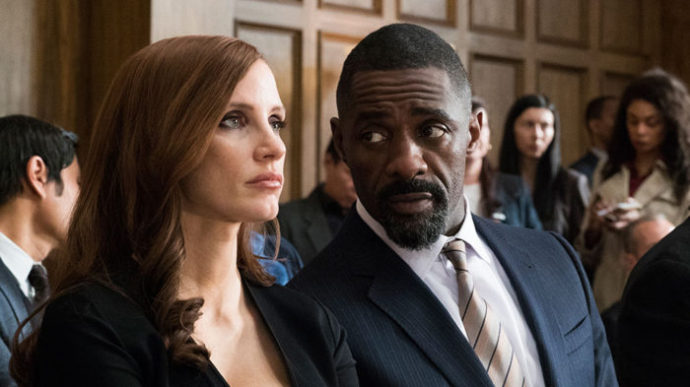Molly’s Game opens with narration from Jessica Chastain, as her character, Molly Bloom, attempts to qualify for the 2002 Winter Olympics through a qualifying moguls event. It is within that two minutes that Chastain fast talks her way through her entire life story, detailing her experience as a skier, her relationship with her father, and what caused her to lose her shot and lead to her long story where she finds herself as the target of an FBI investigation under her hidden poker games she runs with celebrities, business tycoons, and the Russian mob, ending with a darkly comic punch line about the usual answer athletes give. It is within those brief two minutes that Aaron Sorkin’s fast pace and talkative sceenplay is in full form in this film.
Aaron Sorkin has solidified himself as one of the most distinctive writers in entertainment ever since his breakout success with the Broadway play A Few Good Men. Molly’s Game is an interesting case, as for the first time, Sorkin is directing his own script. While the film and its writing doesn’t quite match up to Sorkin’s other recent works, this character drama still manages to offer a well-written and fast-paced piece that is a perfect starring vehicle for Jessica Chastain.
This film is more or less the Chastain show, as while the supporting cast does have a lot of charm to them, Chastain is the main focus, and is the entire soul of the feature. Thankfully, Chastain pulls off Molly Bloom, and while it isn’t new territory for her, she’s still able to play off both the tough-as-nails yet sympathetic portrayal rather well, and works as an entertaining lead. Idris Elba is also entertaining as Bloom’s lawyer Charlie Jaffey, and while Elba also isn’t in any new territory, he’s still an entertaining presence and plays off of Chastain very well. The one-shot supporting characters are the real highlights. Michael Cera as the composite character “Player X” is great, and steals the few scenes he’s in, as does Kevin Costner as Molly’s father. Brian D’Arcy James and Chris O’Dowd also have fun cameos.
Although Molly’s Game is still entertaining, and the cast is certainly an important part of the film’s high points, there are plenty of downsides that made this potentially great movie into something that is just merely good, and it ironically comes down to Sorkin. Sorkin’s an amazing writer, with a unique and entertaining style, but he’s best when restrained. Recent biopics he has worked on like The Social Network, Moneyball, and Steve Jobs work as well as they do, because while Sorkin’s usual tropes are present throughout the feature, the directors are able to pull back on Sorkin’s more aggravating tendencies, in turn leading to a better project. But with Sorkin as the director, all of his usual tendencies are at full blast, and while it could have been far worse, especially considering how fast-paced this 140-minute romp is, a lot of the elements that Sorkin has often been criticized for is done at full blast. Constant narration, dialogue that tries to cram exposition a mile a minute, and actors trying to fight with one another in how fast and witty their lines can be.
This unfortunately leads to a lot of convoluted moments in the story, as Sorkin attempts to explain the basics of poker for audience members unfamiliar with the sport, while also trying to explain Molly’s backstory, how she ended up into the underground poker world, who was a part of her games, and more, all the while cutting back to different time periods in her life. And considering Sorkin’s known for being quick in his writing and dialogue, this leads to a very overwhelming script. The exposition goes uncomfortably fast at times, leading the film to be confusing and tiresome throughout many sequences, which sadly leads to an uneven film.
Molly’s Game is still a solid drama, largely due to Chastain and her supporting players, but it’s frustrating to see a film that is merely good that could have been great with one more rewrite or reedit to simplify things for the audience and to loosen the pace just a touch more.
